外研版(2019)选择性必修4 Unit 6 Space and beyond Listening课件(14张PPT含视频和音频)
文档属性
| 名称 | 外研版(2019)选择性必修4 Unit 6 Space and beyond Listening课件(14张PPT含视频和音频) |
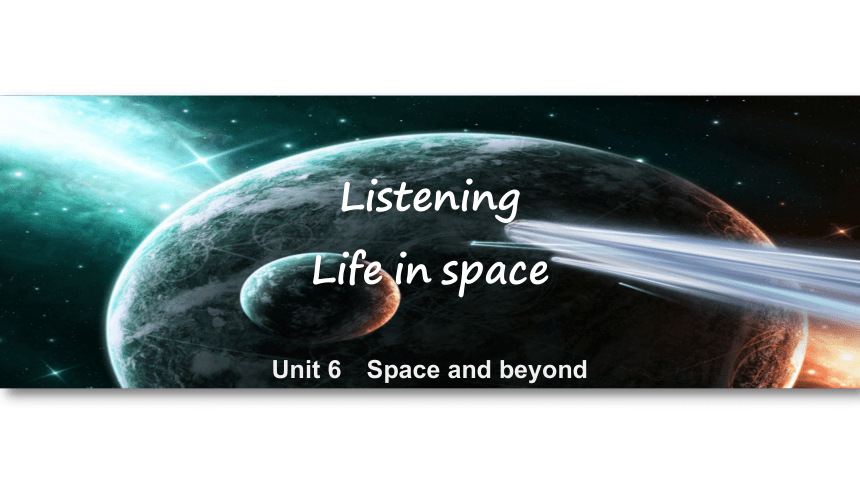
|
|
| 格式 | pptx | ||
| 文件大小 | 47.1MB | ||
| 资源类型 | 教案 | ||
| 版本资源 | 外研版(2019) | ||
| 科目 | 英语 | ||
| 更新时间 | 2024-04-27 00:00:00 | ||
图片预览

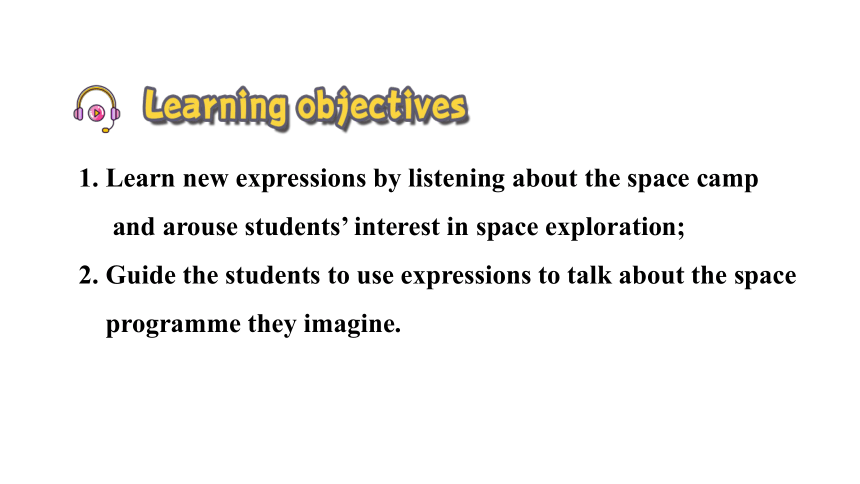
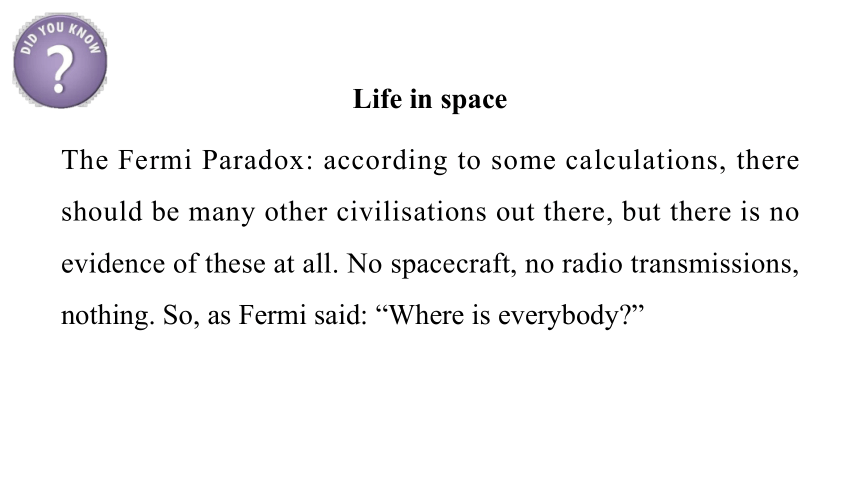
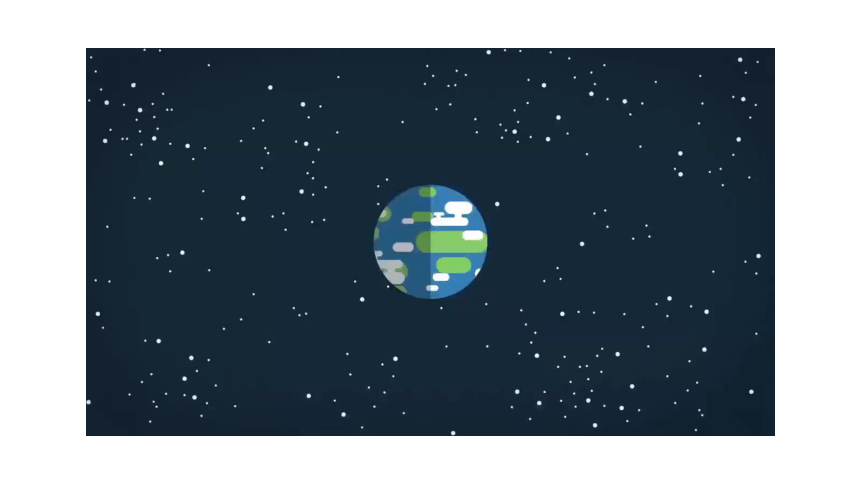

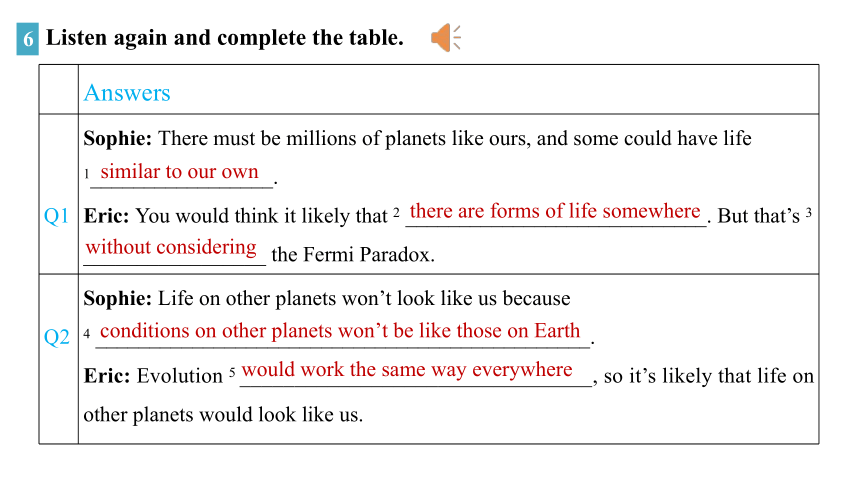
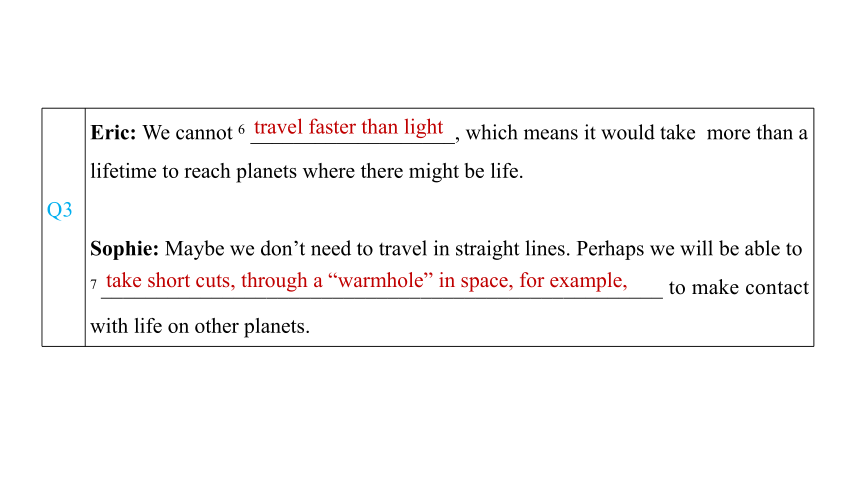
文档简介
(共14张PPT)
Unit 6 Space and beyond
Listening
Life in space
1. Learn new expressions by listening about the space camp
and arouse students’ interest in space exploration;
2. Guide the students to use expressions to talk about the space
programme they imagine.
Life in space
The Fermi Paradox: according to some calculations, there should be many other civilisations out there, but there is no evidence of these at all. No spacecraft, no radio transmissions, nothing. So, as Fermi said: “Where is everybody ”
Listen to the interview and choose the questions discussed.
Is there life on other planets
What would life on other planets look like
Should we use robots to explore space
What is the Fermi Paradox
Will people ever make contact with life on other planets
√
√
√
5
Listen again and complete the table.
Answers
Q1 Sophie: There must be millions of planets like ours, and some could have life
1_________________.
Eric: You would think it likely that 2 ____________________________. But that’s 3 _________________ the Fermi Paradox.
Q2 Sophie: Life on other planets won’t look like us because
4 ______________________________________________.
Eric: Evolution 5 ________________________________, so it’s likely that life on other planets would look like us.
similar to our own
there are forms of life somewhere
without considering
conditions on other planets won’t be like those on Earth
would work the same way everywhere
6
Q3 Eric: We cannot 6 ___________________, which means it would take more than a lifetime to reach planets where there might be life.
Sophie: Maybe we don’t need to travel in straight lines. Perhaps we will be able to
7 ___________________________________________________ to make contact with life on other planets.
travel faster than light
take short cuts, through a “warmhole” in space, for example,
Interviewer: Welcome to our discussion programme, Science, Fact or Fiction . On tonight’s show, we’ll talk about life on other planets with scientist Eric Pringle, and science fiction author Sophie Ellis. Sophie, can I start with you on a favourite topic for science fiction authors Is there life on other planets
Sophie: I think there definitely is. There must be millions and millions of planets like our Earth out there. And on some of them there will be forms of life, maybe similar to our own.
Interviewer: Eric
Eric: As a scientist, I can’t agree with Sophie here. Statistically, you would think it likely that there are forms of life somewhere. But that’s without considering the Fermi Paradox.
Listening materials
Interviewer: What do you say to that, Sophie
Sophie: I’m afraid I don’t agree that the Fermi Paradox is a problem. Maybe they
don’t even want to communicate with us, just as we don’t want to communicate with
mice!
Eric: I admit that this is a possible answer to the Fermi Paradox. But we just don’t
know at the moment.
Interviewer: Well, let’s assume life is out there. What would this life look like
Sophie: Since conditions on other planets won’t be like those on Earth, it isn’t
reasonable to think that they will be like us at all. For example, on an ocean planet,
they could look like fish. It has even been suggested that on a cloud planet they could
look like balloons.
Interviewer: What do you think, Eric
Eric: Well, there’s evidence that evolution would work the same way everywhere, so
it’s actually quite likely that life on other planets would in many ways look like us.
Possibly they’re smarter and more advanced.
Interviewer: I can understand both points of view. It would be wonderful if we could see what they look like. Will humans one day travel to make contact with them
Eric: No, I’m afraid not. This only exists in the imagination of science fiction writers. The fact that we cannot travel faster than light, 300,000 kilometres a second, means that it will take more than a lifetime to reach planets where there might be life.
Interviewer: What’s your opinion, Sophie
Sophie: I take your point, but maybe we won’t need to travel in straight lines. Perhaps we will be able to take short cuts, through a “wormhole” in space, for example. The fact is the imagination of science fiction writers has often pointed the way to the future. Just think of all the predictions about space travel made by Arthur C. Clarke.
Interviewer: I think you’ve both made good points. Thank you for being on the programme, and let’s hope that one day we will find out the solution to the Fermi Paradox—and maybe contact other civilisations!
Expressing opinions
Expressing hopes
A. I think there definitely is.
B. Since..., it isn’t reasonable to...
C. There’s evidence that...
D. It would be wonderful if...
E. The fact that... means...
F. Let’s hope that...
Complete the boxes with the expressions from the interview.
I think there definitely is.
Since…, it isn’t reasonable to…
There’s evidence that…
The fact that.. means…
It would be wonderful if…
Let’s hope that…
7
1. What is the passage mainly about
Work in pairs. Read the passage and answer the questions.
The passage is mainly about the Space Camp.
8
2. Would you like to take part in a space camp Why or why not
THANKS
Unit 6 Space and beyond
Listening
Life in space
1. Learn new expressions by listening about the space camp
and arouse students’ interest in space exploration;
2. Guide the students to use expressions to talk about the space
programme they imagine.
Life in space
The Fermi Paradox: according to some calculations, there should be many other civilisations out there, but there is no evidence of these at all. No spacecraft, no radio transmissions, nothing. So, as Fermi said: “Where is everybody ”
Listen to the interview and choose the questions discussed.
Is there life on other planets
What would life on other planets look like
Should we use robots to explore space
What is the Fermi Paradox
Will people ever make contact with life on other planets
√
√
√
5
Listen again and complete the table.
Answers
Q1 Sophie: There must be millions of planets like ours, and some could have life
1_________________.
Eric: You would think it likely that 2 ____________________________. But that’s 3 _________________ the Fermi Paradox.
Q2 Sophie: Life on other planets won’t look like us because
4 ______________________________________________.
Eric: Evolution 5 ________________________________, so it’s likely that life on other planets would look like us.
similar to our own
there are forms of life somewhere
without considering
conditions on other planets won’t be like those on Earth
would work the same way everywhere
6
Q3 Eric: We cannot 6 ___________________, which means it would take more than a lifetime to reach planets where there might be life.
Sophie: Maybe we don’t need to travel in straight lines. Perhaps we will be able to
7 ___________________________________________________ to make contact with life on other planets.
travel faster than light
take short cuts, through a “warmhole” in space, for example,
Interviewer: Welcome to our discussion programme, Science, Fact or Fiction . On tonight’s show, we’ll talk about life on other planets with scientist Eric Pringle, and science fiction author Sophie Ellis. Sophie, can I start with you on a favourite topic for science fiction authors Is there life on other planets
Sophie: I think there definitely is. There must be millions and millions of planets like our Earth out there. And on some of them there will be forms of life, maybe similar to our own.
Interviewer: Eric
Eric: As a scientist, I can’t agree with Sophie here. Statistically, you would think it likely that there are forms of life somewhere. But that’s without considering the Fermi Paradox.
Listening materials
Interviewer: What do you say to that, Sophie
Sophie: I’m afraid I don’t agree that the Fermi Paradox is a problem. Maybe they
don’t even want to communicate with us, just as we don’t want to communicate with
mice!
Eric: I admit that this is a possible answer to the Fermi Paradox. But we just don’t
know at the moment.
Interviewer: Well, let’s assume life is out there. What would this life look like
Sophie: Since conditions on other planets won’t be like those on Earth, it isn’t
reasonable to think that they will be like us at all. For example, on an ocean planet,
they could look like fish. It has even been suggested that on a cloud planet they could
look like balloons.
Interviewer: What do you think, Eric
Eric: Well, there’s evidence that evolution would work the same way everywhere, so
it’s actually quite likely that life on other planets would in many ways look like us.
Possibly they’re smarter and more advanced.
Interviewer: I can understand both points of view. It would be wonderful if we could see what they look like. Will humans one day travel to make contact with them
Eric: No, I’m afraid not. This only exists in the imagination of science fiction writers. The fact that we cannot travel faster than light, 300,000 kilometres a second, means that it will take more than a lifetime to reach planets where there might be life.
Interviewer: What’s your opinion, Sophie
Sophie: I take your point, but maybe we won’t need to travel in straight lines. Perhaps we will be able to take short cuts, through a “wormhole” in space, for example. The fact is the imagination of science fiction writers has often pointed the way to the future. Just think of all the predictions about space travel made by Arthur C. Clarke.
Interviewer: I think you’ve both made good points. Thank you for being on the programme, and let’s hope that one day we will find out the solution to the Fermi Paradox—and maybe contact other civilisations!
Expressing opinions
Expressing hopes
A. I think there definitely is.
B. Since..., it isn’t reasonable to...
C. There’s evidence that...
D. It would be wonderful if...
E. The fact that... means...
F. Let’s hope that...
Complete the boxes with the expressions from the interview.
I think there definitely is.
Since…, it isn’t reasonable to…
There’s evidence that…
The fact that.. means…
It would be wonderful if…
Let’s hope that…
7
1. What is the passage mainly about
Work in pairs. Read the passage and answer the questions.
The passage is mainly about the Space Camp.
8
2. Would you like to take part in a space camp Why or why not
THANKS
